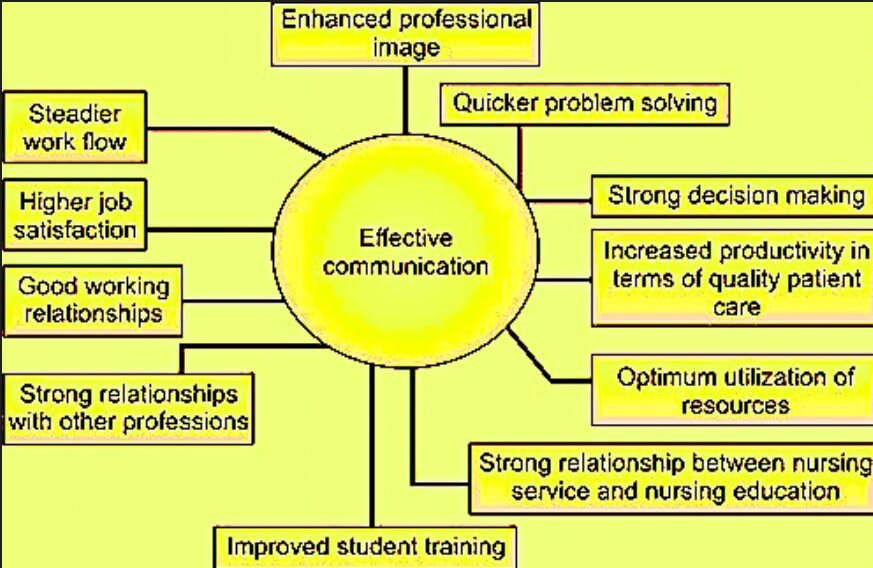Master the art of effective communication in nursing. Explore essential skills, best practices, and the impact on patient satisfaction and healthcare success.
Effective communication is the bedrock of exceptional nursing care. It goes beyond mere information exchange; it’s about establishing trust, alleviating anxiety, and cultivating healing partnerships. In the intricate realm of healthcare, where emotions and decisions intertwine, a nurse’s proficiency in communication becomes a powerful tool.

Why is Communication so Crucial in Nursing?
Patient-Centered Care
Effective communication enables nurses to comprehend patients’ needs, fears, and expectations, fostering collaborative decision-making and ensuring care aligns with their values.
Improved Safety and Outcomes
Clear communication minimizes misunderstandings and medication errors, ensuring timely interventions and adherence to treatment plans for enhanced patient outcomes.
Building Trust and Rapport
Empathetic communication builds trust. Actively listening, validating concerns, and showing genuine care create a safe space for open communication, resulting in more effective care delivery.
Reduced Stress and Anxiety
Clear explanations and proactive communication reduce patient anxiety, promote cooperation, and facilitate the healing process.
Enhanced Teamwork and Collaboration
Effective communication strengthens collaboration within the healthcare team, ensuring coordinated care and preventing errors.
Essential Communication Skills for Nurses
Verbal Communication
- Speak clearly and concisely, tailoring language to the patient’s understanding.
- Avoid medical jargon and complex terminology.
- Use a calm, reassuring tone that conveys empathy and professionalism.
- Ask open-ended questions to encourage patients to share concerns.
- Actively listen, make eye contact, and show nonverbal cues of engagement.
- Summarize key points and confirm understanding for clarity.
Nonverbal Communication
- Maintain open body language and respect professional boundaries.
- Use positive facial expressions and avoid appearing rushed.
- Be mindful of cultural differences in nonverbal communication.
Active Listening
- Give full attention, minimizing distractions.
- Paraphrase and reflect to demonstrate understanding.
- Ask clarifying questions to ensure accurate information.
- Be patient, allowing time for the patient to express themselves fully.
Written Communication
- Document patient interactions accurately using appropriate medical terminology.
- Communicate clearly in progress notes, orders, and reports.
- Avoid abbreviations or jargon that could be misinterpreted.
- Proofread documents carefully before finalizing.
Cultural Competency
- Be aware of cultural differences and respect religious beliefs.
- Use interpreters when necessary for accurate communication across language barriers.
Strategies for Enhancing Effective Communication in Nursing
- Regularly assess communication skills and seek feedback.
- Practice active listening through role-playing exercises.
- Undertake cultural competency training to understand diverse communication styles.
- Utilize communication tools, such as electronic health records, effectively.
- Foster a supportive team environment that encourages open communication.
The Impact of Effective Communication in Nursing
By honing their communication skills, nurses can:
- Improve patient satisfaction and build lasting relationships.
- Enhance adherence to treatment plans and medication regimens.
- Reduce adverse events and medication errors.
- Promote patient empowerment and shared decision-making.
- Create a positive and therapeutic healthcare environment.
Overcoming Communication Challenges in Healthcare:
Effectively navigating the intricacies of healthcare communication can pose considerable challenges. Here are some prevalent obstacles and corresponding strategies to surmount them:
- Cultural and Language Barriers:
- Strategy: Employ interpreters when language disparities arise, exhibit patience in the face of communication challenges, and undergo cultural competency training to foster an understanding of diverse perspectives.
- Emotional Patients:
- Strategy: Maintain a calm and professional demeanor, provide gentle reassurance to alleviate emotional distress, and skillfully redirect the conversation when necessary to ensure effective communication.
- Difficult Conversations:
- Strategy: Equip yourself for challenging discussions, such as those involving terminal illnesses or delivering bad news. Practice empathy and compassion, offering ongoing support to navigate these sensitive conversations successfully.
- Time Constraints:
- Strategy: Prioritize effective communication while upholding safety standards. Implement time management techniques to streamline interactions, and delegate tasks efficiently to optimize communication within the constraints of limited time.
Conclusion
In conclusion, effective communication in nursing is not merely a skill; it is a fundamental aspect of providing high-quality patient care. By mastering the nuances of verbal and non-verbal communication, embracing empathy, and navigating the challenges of interprofessional collaboration, nurses can truly elevate their practice.
FAQs
Why is effective communication important in nursing?
Effective communication is crucial in nursing as it builds trust, ensures patient-centered care, and contributes to improved safety and outcomes.
How does effective communication reduce stress and anxiety in patients?
Clear explanations and proactive communication about procedures and expectations help patients feel prepared and in control, reducing anxiety.
How can nurses enhance their communication skills?
Nurses can enhance communication skills by regularly assessing them, practicing active listening, undergoing cultural competency training, utilizing communication tools, and fostering a supportive team environment.
